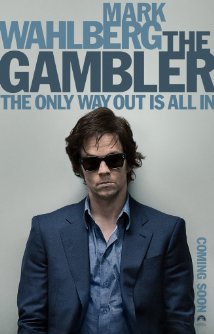
THE GAMBLER
US, 2014, 111 minutes, Colour.
Mark Wahlberg, John Goodman, Jessica Lange, Michael Kenneth Williams, Anthony Kelley, Brie Larson, George Kennedy.
Directed by Rupert Wyatt.
In 1974 there was a rather grim film, The Gambler, written by James Toback, his first screenplay - and he was to go on to direct some rather blunt and grim films. James Caan portrayed the title gambler.
Movie-making powers that be decided that 40 years later it was worth telling the story again. Not so sure!
This is certainly a grim film while it has some very strong credentials, the adaptation of Toback’s script by William Monahan who has written such screenplays as The Departed and directed by British Rupert Wyatt, who made an impact with a very different kind of film, The Rise of the Planet of the Apes. This time Mark Wahlberg is a gambler of the title and there is an interesting supporting cast including Jessica Lange as his mother, Brie Larson as a student with whom he is having a relationship, John Goodman as a more kind-hearted loan shark, Michael Kenneth Williams as the gambler’s nemesis, and a few moments at the beginning of the film with veteran George Kennedy as the hero’s dying father.
Jim Bennett is a professor of literature and we are shown some of his classes, his reflections on Shakespeare, his love of language, the reaction of the students. Bennett is in a compromising position in having a relationship with a student. But he has an even shadowier life in terms of gambling, going to the casinos, not content with to take away any winnings, but seemingly compelled to bet and to bet until he has lost. It seems a kind of death wish.
The casino authorities are wary of him. But a smooth-talking entrepreneur gambler, Neville (Michael Kenneth Williams) interests himself in Bennett, offering lending deals, getting Bennett in his own-shark tentacles. And Bennett allows himself to be caught.
While not winning at the tables, he takes the opportunity to borrow from his mother, a rather hard Jessica Lange who realises that she has alienating her son, but nevertheless goes to a bank to give him access to money. The other source is Frank (John Goodman) who becomes something of a father-figure to Bennett, prepared to support him, but warning him to exercise some gambling prudence.
This all means that Jim Bennett has to face himself, his future, his gambling which he thinks is not an addiction, his relationship with his girlfriend, his dependence on Frank. Rather shrewdly, he works out a way of playing Frank off against Neville, going to a neutral gambling house and playing and playing the house so that his debts might be paid off.
Will they? Will he be able to stop? (And how easy is it to be sympathetic to Jim Bennett as a character for us to want him to achieve some kind of redemption?)
1. A film about gambling? A symbol of other addictions in risk-taking? Death wish?
2. The existential aspects of the film, life, its meaning, self-image, relationships, threats and challenges, defiance? Possible redemption?
3. An American story? The world of the affluent? The world of sports? The world of gambling? The gambling places, the bosses? The contrast with the University, the lecture hall? The streets? Basketball? Atmosphere? The musical score?
4. The prologue, Jim and his dying grandfather, the conversation, leaving money or not? His seeming indifference? The death, the funeral, leaving early? His relationship with his mother?
5. Going to gamble, the amount of cash, getting the chips, continuing to win, ultimately losing? Audience reaction to his character, his gambling, his venturing more money, losing? How much interest? How much sympathy?
6. Neville, watching Jim, the comments about his hat, the conversations, Neville wanting to back him, the money, the 20 points of interest? His thugs and entourage? His personality, observing, interest, risks?
7. The Koreans, the casino, at the tables, the staff, the boss, his demands?
8. Jim and his relationship with Frank, Frank’s organisation, the money loans, but his mentoring, giving advice on having money in reserve? The loan and the final demands?
9. Jim’s mother, coming in to the bath, coming to the house, and with her son, her past life, the bank, his father? The discussions, going to the bank, the interview and her being demanding, getting the cash? Giving it to Jim? Walking away? Her later being seen playing tennis with Dexter?
10. The surprise to find that Jim was a lecturer, English literature, the students and their questions, Lamarr and his mobile phone? Issues of Shakespeare and authorship? The Duke of Oxford and the nature of genius? Dexter explaining his success at tennis and his desires? Miss Phillips, genius, writing, attention on her?
11. Jim and his published book, deprecating himself, issues and genius? Reality?
12. Jim, morose, seeming indifference, his manner of gambling, without emotions? The vivid dreams? His being abducted, tortured, his injuries? Torture wish? Death wish?
13. Neville, his interesting Lamarr, the pressures on Jim, the game and the margin of victory? Jim present, Neville watching on television? Lamarr being sent off? Return, his victory? The threats to Amy? Jim and his relationship with her?
14. Dexter, the return from Las Vegas, bringing the winnings? His refusal to take cash?
15. The mother’s money, but the Las Vegas win? The set-up with the Korean and Frank, both coming to the neutral betting ground? Jim entering, the visuals of the location? Betting on black, not watching? Winning? The payoff to the Korean? To Frank? Jim saying he was not a gambler?
16. The run, his exhilaration, going to Amy’s room? The future?
17. An existential exploration and dramatising of gambling? A cautionary tale or not? The effect on non-gamblers, simply observing? For gamblers – no lesson, perhaps not particularly interested?